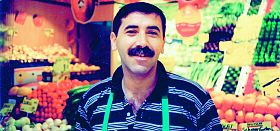7.2 At the greengrocer's 
 Having despaired of getting her son to go shopping for her, Anna Müller decides that she will go herself. She stops first at Müslüm Can's greengrocer's in Kreuzberg. Listen to their conversation by clicking here or on the sound icon at the top of this paragraph. Having despaired of getting her son to go shopping for her, Anna Müller decides that she will go herself. She stops first at Müslüm Can's greengrocer's in Kreuzberg. Listen to their conversation by clicking here or on the sound icon at the top of this paragraph.
 |
 |
| Conversation 2: Im Gemüsegeschäft |
| Anna Müller |
Ein Kilo Äpfel, bitte! |
| Müslüm Can |
Wir haben da verschiedene Äpfel, englische, französische, spanische... |
| Anna Müller |
Englische. |
| Müslüm Can |
Englische... so, ein Pfund Äpfel. |
| Anna Müller |
Dann noch ein Kilo Birnen, bitte! |
| Müslüm Can |
Möchten Sie eine süße Birne oder eine saure? |
| Anna Müller |
Ah, ich nehme eine süße, bitte. Saure Birnen schmecken mir nicht! |
| Müslüm Can |
So, bitte. Möchten Sie sonst noch etwas? |
| Anna Müller |
Ich hätte gern zwei Pfund Karotten. |
| Müslüm Can |
Da, zwei Pfund polnische Karotten. |
| Anna Müller |
Dann noch eineinhalb Pfund Zwiebeln. |
| Müslüm Can |
Da hätten wir rote, weiße und normale Zwiebeln. |
| Anna Müller |
Weiße bitte. Und ich hätte gerne zwei Pfund Trauben. |
| Müslüm Can |
Ja, ich habe verschiedene Sorten. Welche möchten Sie denn, grüne oder schwarze? |
| Anna Müller |
Ich hätte gerne die grünen. |
| Müslüm Can |
Ja, sie schmecken lecker! So, bitte schön. |
| Anna Müller |
Was kosten die Bananen? |
| Müslüm Can |
Ein Euro vierzig das Pfund. |
| Anna Müller |
Und die Apfelsinen? |
| Müslüm Can |
Sie kosten neunzig Cent das Stück. |
| Anna Müller |
Oh, sie sind leider viel zu teuer. Ich gehe lieber auf den Markt. |
| Müslüm Can |
Sonst noch etwas? |
| Anna Müller |
Das wär's. Was macht das zusammen? |
| Müslüm Can |
Das macht sechsundzwanzig Euro und siebzig. |
| Anna Müller |
Da sind dreißig Euro. |
| Müslüm Can |
Danke schön. Und drei Euro und dreißig Cent bekommen Sie zurück. Vielen Dank. |
|
| Glossary |
| das Gemüsegeschäft (-e) |
The greengrocer's |
| im Gemüsegeschäft |
in the greengrocer's |
der Apfel
(pl. - Äpfel) |
apple |
| das Kilo |
"A kilogram(me)". The shortened form is more common when a product
(such as apples) is specified afterwards. |
| da |
here, there |
| verschiedene |
"various". We might translate this sentence by saying "We have many different types of apple". |
| englisch |
"English". Note that adjectives of nationality are written with small
letters in German. |
| französisch |
French |
| spanisch |
Spanish |
| dann noch... |
Then I'd like... |
| die Birne (-n) |
This is the word for a "pear". Because of the shape, this is also
the word for a light-bulb. |
| süß |
sweet |
| sauer |
This means "sour". Note in particular that when adjectives which end in
"-er" take adjective endings, the "-e" disappears. Thus it is here "saure Äpfel". |
| ...schmecken mir nicht |
This means "I don't like sour pears". The verb "schmecken" means "to taste", so this literally means "They don't taste (very good) to me". The thing that you do or do not like the taste of is always the subject of the sentence, whilst the person who doesn't like the taste is always in the dative case. |
| Möchten Sie sonst noch etwas? |
"Would you like anything else?". We have already met "sonst noch etwas" on its own. |
| ich hätte gern |
"I would like". We have already met "Ich möchte gern", which is another variant of this expression. |
| die Karotte (-n) |
This means "carrot". You might also see "carrot" translated by "die Möhre (-n)". |
| polnisch |
Polish |
| eineinhalb |
"One and a half". We have already met "anderthalb",
which means the same thing. |
| die Zwiebel (-n) |
onion |
| da hätten wir... |
"We have...". A politer way of saying "da haben wir". |
| rot |
red |
| weiß |
white |
| normal |
This means "normal", surprisingly enough, but is pronounced slightly
differently. |
| die Traube (-n) |
This means "grape". You might also see
"die Weintraube (-n)". |
| die Sorte (-n) |
sort, type |
| schwarz |
black |
| die grünen |
"the green (ones)". There is no need in German to repeat a
noun or a pronoun. |
| lecker |
tasty, delicious |
| sie schmecken lecker |
they taste delicious |
| die Banane (-n) |
banana |
| Ein Euro vierzig das Pfund |
"One euro forty per pound". The definite article is used in German
where we would use the preposition "per". |
| die Apfelsine (-n) |
No, not a variety of apple, but an "orange". You might also translate
this by "die Orange (-n)". |
| neunzig Cent das Stück |
Ninety cents "each". We have already seen that "das Stück" usually means "a piece". |
| viel zu teuer |
far too expensive |
| ich gehe lieber... |
I prefer to go... |
| auf den Markt |
This means "to the markt". You would translate "at the market" by "auf dem Markt". |
| das wär's |
that's all |
| was macht...? |
what does that come to? |
|
 Chapter 7.3: At the supermarket Chapter 7.3: At the supermarket

 Print This Page Print This Page
|